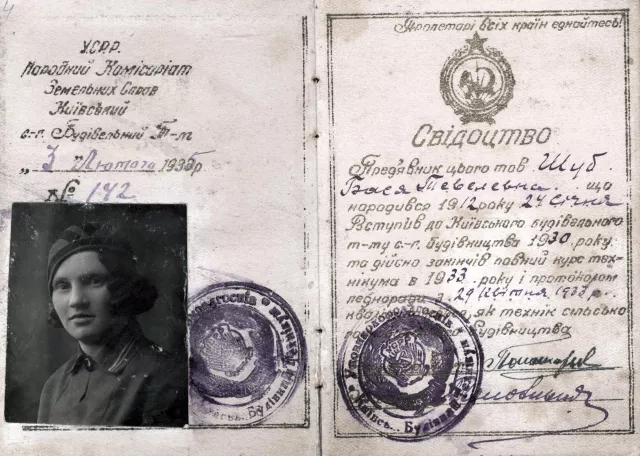Construction school diploma with the picture of my mother Basia Shub. Issued on 3 February 1935. Photograph taken in 1935 in Kiev.
As it was, the family consisting of six children and my grandmother arrived in Kiev. They arrived in hungry Kiev (hunger of 1921 in Ukraine).
.
Mamma studied very well. Only Ukrainian was difficult for her.
Mamma never told me about celebration of Jewish holidays in the family. I don't think they celebrated any. Six children was quite a load for grandmother. They had enough to eat, but they didn't have enough money or time to celebrate holidays. Mamma attended Jewish school in her childhood, but after moving to Kiev the family didn't observe any Jewish traditions or celebrate holidays.
At that time something happened that mamma couldn't talk about without tears until the last days of her life. People called this period of the early thirties "zolotushki' (from word zoloto - gold). Authorities needed money. They turned to those who were doing some business during NEP or had a license. Mamma was summoned to come to NKVD (People's Commissariat of Internal Affairs), where they said to her: "Give us your gold". This sounded ridiculous to her. But they in the police didn't believe she didn't have any and put her behind bars, in the basement of that building. She told us later that each coming woman was put in a circle of big women and they pushed her from one to another until the person fell from exhaustion. Mamma was very strong - she had ideal health, but staying at this place affected her health a lot. Her sisters addressed management at the school where she studied asking them to help her. People from the school knew that sisters from this family shared one pair of shoes. They talked to the police, telling them that Shub was their best student, and that they couldn't have any gold. After that they let her go. This was in 1932.
After finishing this technical school mamma took a job of estimator in Dnepro river fleet. Mamma told us that she was very fond of the komsomol league activities. She told us about voskresnik (voluntary work on Sunday), their trips to collect the crops, and also, they went to get some gravel. They thought it was a whole world and there was no other world - America, England or Europe. Here was gravel, that truck, difficulties and tribulations - this was their life. They entertained together as well. They went to the beach, located across the street from our home. They sang komsomol and Soviet songs together - they enjoyed it so! That is what mamma told us. Her circle of friends consisted of Jewish people, basically. However, they did not think of themselves as part of the Jewish nation nor were they interested in the Jewish history, culture or religion. My mother said that representatives of different nationalities got along very well.
Mamma met my father during one of such komsomol trips. It might have never come to going out with him, had he not been insistent and even rude. Mamma was dating a Jewish boy at that time. My father met him once and said: "If you keep coming here I will cut off your head". That guy stopped coming, and in the end my mamma married my father. Neither her sisters and brothers nor my grandmother could treat him as member of the family. He was different. He was Jewish, of course, but different. It was a tragedy for my mother.
My father was born in 1905 in Belopolie village in Ukraine. His name was Shyko Noiyahovich, his last name was Bitman. He came from a family of working people. But his parents had passed away by then. His father had been a carpenter, he had worked in the cultural center "Pischevik".
My parents got married in 1936 and they were living in our apartment. Older sister Asia had already been married by then. Mother and father were living in a 12-meter room. I was born in 1937 and there were three of us sharing that little room.












